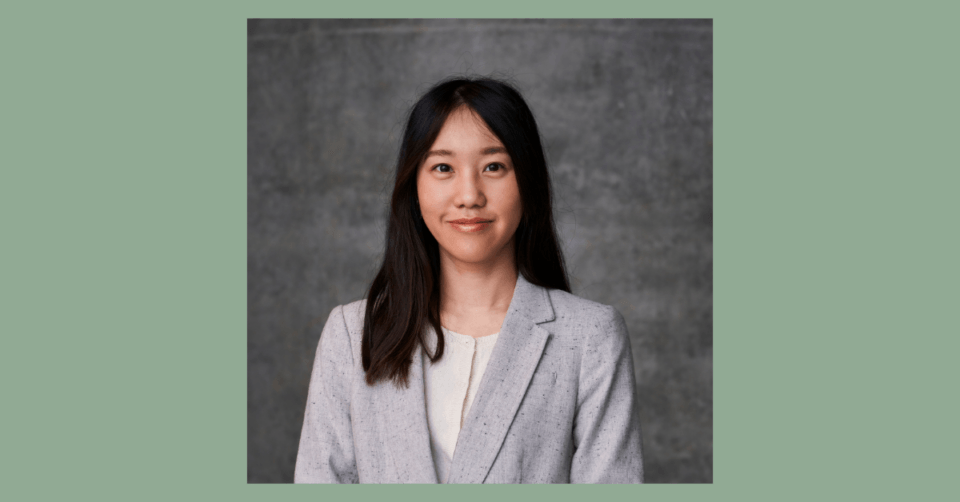4 November 2024
Postdoctoral researcher Wenning Zheng is among the four talented skin researchers to receive a LEO Foundation Dr Abildgaard Fellowship of DKK 12 million. Wenning Zheng’s research focuses on tracking skindiseases by identifying rare, aggressive T cells using computational modeling and experimental biology.
Wenning Zheng, who will be Assistant Professor from 1 January 2025 at the University of Copenhagen, is one of four Dr Abildgaard Fellows of 2024. She receives the fellowship for her skin research, which addresses a critical question in immunology: how immune cells from the skin, particularly resident memory T cells (TRM), can travel through the blood and potentially contribute to disease in other parts of the body. This understanding is key as many patients with skin diseases like eczema and psoriasis also suffer from related conditions, such as asthma or arthritis, suggesting that these diseases may be linked by common immune pathways.
“People living with skin diseases often experience relapses, even after resolution of old lesions following treatments. My research focuses on identifying the blood biomarkers that may trigger these relapses with the goal of developing a preclinical prognosis tool for skin diseases. By detecting these biomarkers in high-risk people, we can enable early treatment and prevent the worsening of their conditions. Ultimately, this research aims to reduce healthcare cost and improve patients’ quality of life,” Wenning Zheng says.
Research focus
Wenning Zheng’s research is centered on T cell biology, with a focus on the immune mechanisms underlying chronic diseases and autoimmune disorders. Her path as a researcher has taken her from studying DNA alterations in T cell-driven lymphomas at the Cancer Science Institute of Singapore to postdoctoral work at Karolinska Institutet and now, at the LEO Foundation Skin Immunology Research Center at the University of Copenhagen.
Her expertise is in bioinformatics, a rapidly growing field that combines biology with computational techniques to make sense of complex biological data. At Karolinska Institutet and the University of Copenhagen, she leveraged single-cell sequencing technology to explore the immune functions of T cells in both healthy skin and skin cancer. These findings paved the way for her current focus: understanding how blood T cells contribute to autoimmune skin diseases, such as psoriasis and eczema, and how these diseases may also lead to joint conditions like psoriatic arthritis.
By applying high-resolution single-cell sequencing, machine learning and high sensitivity assay, she aims to discover novel antigens that could lead to more precise diagnosis and treatment of chronic skin conditions like eczema and psoriasis.
Long term vision
Zheng envisions her research making a profound impact on the management of skin diseases. By identifying biomarkers that can predict disease relapses, her work could lead to the development of preclinical tools capable of detecting early signs of skin disease flare-ups, allowing for more timely treatment. This would not only improve the quality of life for patients but also reduce the burden on healthcare systems by lowering the risk of severe disease progression.
Wenning Zheng aims to lead a research group that delves deeper into the immune repertoire of various diseases, employing advanced methods like machine learning and multi-omics immune profiling. Her goal is to bridge the gap between data science, life science, and clinical practice, ultimately contributing to the development of translational medicine solutions for chronic diseases.
The person behind the researcher
Outside of her research, Wenning Zheng enjoys a fulfilling family life in Copenhagen, where she lives with her husband, son, and dog. They love exploring Denmark’s different parts and spending time outdoors. She also takes pride in being a dedicated “soccer mum,” supporting her son who is a player in their local football club.
As a group leader, Wenning Zheng emphasizes the importance of fostering curiosity, creativity, and independence among young scientists.
“I will aim to ensure open communication and provide coaching and support to my group members in their pursuit of scientific excellence,” she says.
Wenning Zheng’s fellowship is granted as a part of the LEO Foundation’s Dr Abildgaard Fellowships 2024 research theme: Advanced Therapeutics Research in Skin Diseases.
